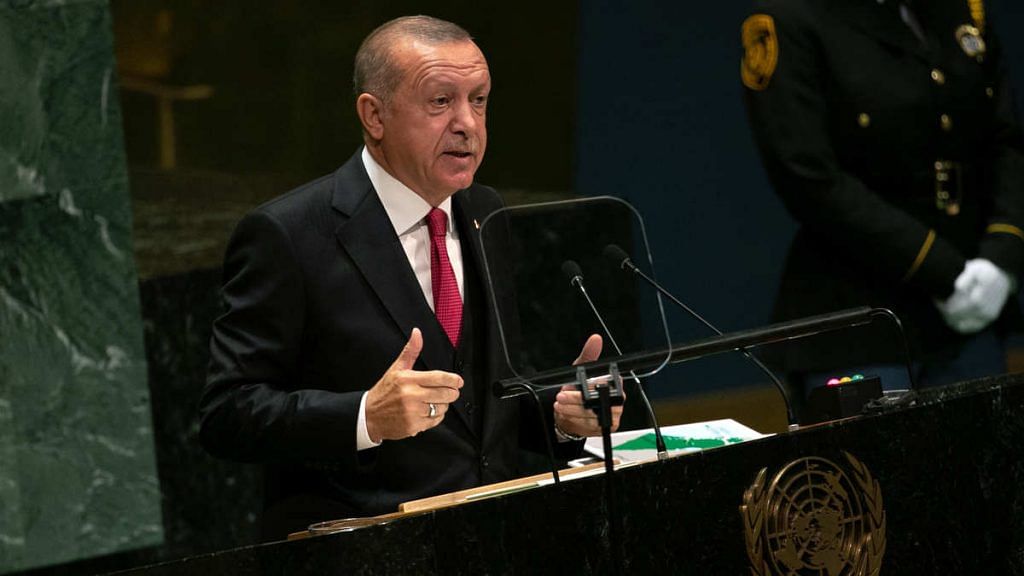New Delhi: Turkish President Recep Tayyip Erdogan’s strident speech at the UN General Assembly on Kashmir and his support for Pakistan shows that New Delhi’s relations with Ankara are on the downswing and that the Modi government has not engaged enough with the country, former diplomats said Thursday.
In his address at the UN in New York Wednesday, Erdogan said the Kashmir issue had to be resolved through “dialogue on the basis of justice, equity, and not through collision”. He added that, over the 72 years since India’s independence and Pakistan’s formation, the “Kashmir conflict” had not received adequate attention from the international community.
His speech came after a bilateral meeting between Erdogan and Pakistan Prime Minister Imran Khan where the scrapping of Article 370 was discussed. India has not issued a statement on Erdogan’s remarks.
“The statement made by Erdogan at the UN General Assembly has surely cast a shadow on the bilateral relationship between India and Turkey,” said M.K. Bhadrakumar, who was India’s ambassador to Turkey from 1998 to 2000.
“But this is also true that Turkey has been rhetorical on Kashmir. All we need to do at this point is engage with them,” he added. “We have become very one-dimensional since Turkey enjoys a friendly relationship with Pakistan. We are not engaging with them at all.”
Also Read: This is how Modi is different from other Right-wing populists like Trump, Erdogan & Duterte
A strained relationship of late
Although this is not the first time that Turkey has weighed in on the Kashmir issue in Islamabad’s favour, India had previously been able to sidestep this and move forward on other issues of bilateral importance.
Historically, since 1947, Turkey has always leaned towards Pakistan, but New Delhi has always been able to take that in its stride and move on.
As Bhadrakumar explained, despite Turkey’s repeated attempts to rake up the issue of Kashmir in Pakistan’s support, New Delhi and Ankara were able to institutionalise a dialogue on the Taliban.
In 2011, the Heart of Asia-Istanbul Process (HoA-IP) — to which India is also a party — was founded on November 2 in Istanbul for the development of Afghanistan.
Earlier, in 2000, under former Prime Minister Atal Bihari Vajpayee, former Turkish Prime Minister Bulent Ecevit came visiting to receive an honorary doctorate of literature from Visva Bharati for his keen interest in the literary works of Rabindranath Tagore.
At the age of 16, Ecevit had translated into Turkish Tagore’s seminal ‘Gitanjali’, a collection of poetry. He was, at the time, the first Turkish premier to visit India in 14 years.
When Ecevit came to India, the then Pakistan president Pervez Musharraf asked him to make a stopover at Islamabad. But despite having deep friendly ties with the country, Ecevit refused the offer in order to not hurt India’s sentiments.
However, the relationship has been strained in recent years despite President Erdogan’s interest in boosting trade and economic ties with India.
Erdogan, a controversial leader at home for his iron-fisted rule and bid to dilute Turkey’s secular character, last visited India in 2017, accompanied by a high-level business delegation.
Both sides had then set a two-way trade target of $10 billion by 2020, up from $6.4 billion at the time. Bilateral trade had only reached $7.84 billion in 2018-19, according to Department of Commerce data.
PM Modi, who makes frequent state visits to different countries, has never visited Turkey since he first took office over five years ago
His silence on Uyghurs
Erdogan’s Kashmir statement stood in sharp contrast to his silence on China’s detention of Uyghur Muslims, a cause he was heard raising until last year, even as he spoke about the plight of Muslims around the world.
This, despite the fact that Turkey is the only Muslim-majority country that has direct links with the Uighurs, a Turkic ethnic group.
Discussing the shift, a former Indian envoy to Ankara said China had been “able to achieve this due to constant dialogue and diplomacy”.
“In fact, Beijing had invited Erdogan and other observers from Turkey to visit the Xinjiang province [where China’s Uyghurs are primarily based]. India should do the same as far as Kashmir is concerned,” the envoy added.
Mustafa Kemal Ataturk, the founder of the modern Turkish republic who has a road named after him in Delhi, had always envisioned creating a country that would not be governed by religion. However, that vision has definitely been reversed under Erdogan, who is now following neo-Ottoman ambitions and is keen to proclaim himself the “caliph of all Muslims”.
“It is true that the kind of engagement India has with the Gulf countries is not happening with Turkey. But it is also true that there are limits to this relationship,” said Talmiz Ahmad, former Indian ambassador to the UAE, Saudi Arabia and Oman.
“We do not have too many complementarities with this country. But we have to also understand that Erdogan is the leader of a party that is an Islamic party. So it is essential for him to uphold Islamic causes,” he added.
Ahmad also stressed that the Turkey-Pakistan friendship dated back to the Cold War-era and that the relationship was only going to get stronger. So, New Delhi, he said, should focus on expanding bilateral ties with Ankara.
Also Read: Turkey willing to mediate between ‘friends’ India and Pakistan, says envoy Sakir Ozkan Torunlar
